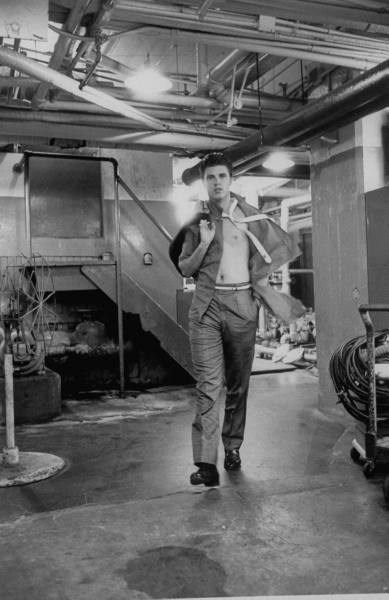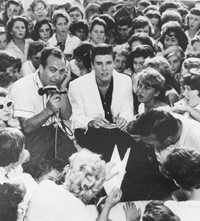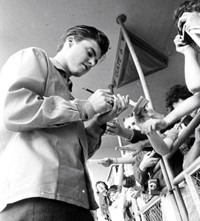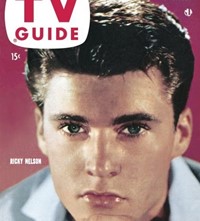50 odd years before tweens were begging for abuse at the hands of their idols, the first teen idol, Ricky Nelson, was being asked by fans to steamroll them, writes Trey Taylor
- TextTrey Taylor
The girls screamed for five straight minutes while Ricky Nelson stood there dumbly. He was nervous and shy and this attention, a decibel blitzkrieg, was unprecedented. “I could tell he was frightened. He didn’t know what to do next,” Jimmie Haskell, Nelson’s arranger and A&R man, recalled to Rolling Stone of one of the teen star’s first ever concerts. “He wanted them to stop screaming so he could start singing, which he knew how to do.”
50 odd years before tweens were begging for abuse at the hands of their idols – tapping out tweets that asked Shawn Mendes to “SMASH my skull between his massive thighs” or told Harry Styles that “we love not breathing,” as a result of his recent interview with Hollywood beanstalk Timothée Chalamet – the first teen idol, Ricky Nelson, was being asked by fans to steamroll them. “Perhaps the most embarrassing moment in my career was when six girls tried to fling themselves under my car, and shouted to me to run over them. That sort of thing can be very frightening!” Nelson told the NME in 1960, a weirdly prescient look at how teen fans would eventually throw down their lives for any kind of acknowledgment from their heroes.
A caption underneath a photo that ran in LIFE magazine in 1958 described the dangers of being “the teen-agers’ top throb.” A group of fans had stormed Nelson’s hotel room in Wichita, Kansas. “Singer became careful of crowds after overzealous fan bit him on the arm,” the caption reads, calling to mind the Grand Guignol surrounding the mystery biter of Beyoncé’s face earlier this year.
The accompanying cover story details how girls “brandishing pictures, records, and even their own clothes at him howl, ‘Just touch it!’ or, ‘Spit on it, Ricky!’” Another famous image of the rockabilly singer and TV phenom is the kindling of teenage dreams: Nelson is walking into his hotel via a secret back kitchen exit, shirt loosely open like the latex of a popped balloon, ripped by thirsty fans following a concert in Oklahoma City. According to a 1958 copy of Look magazine, girls “ambush him in hotel lobbies … chasing his limousine, they squeal, ‘Ricky!’”

Despite his contributions to both rock and roll and teenage eye sockets over the course of his short life, he has since been sucked into pop culture’s black hole. Yet Ricky Nelson was the first teen idol given that very designation by LIFE magazine, who coined the term. There may have been teen idols before him, like the Hungarian composer Franz Liszt, who inspired Lisztomania in the late 17th century, but Nelson, with his ice blue long distance eyes and rockabilly croon, was hot hot. His eyelashes look permanently mascaraed. The “soft, beautiful O” of his ribbon-bow mouth has been immortalised in fiction. He was incalculably handsome, and fell victim to his own good looks.
His was the first #1 song on the Billboard Hot 100, when it was a new thing, with Poor Little Fool. He essentially revived the rock and roll genre. He crashed through the sound barrier in 1957, around the same time Elvis Presley hypnotically thrust his crotch to Jailhouse Rock and similar teen screams. Nelson was the inverse of Elvis’s sexual magnetism – sanitized, cornfed, cute. He would play his hits weekly on the sitcom which made him famous, The Adventures of Ozzie & Harriet, and watch his singles climb the charts.
“At the time, the series was being watched by an estimated ten million teenagers a week,” wrote veteran entertainment reporter Pat H. Broeske. “Nelson's performances became powerful marketing tools – as did the young star, who became a favorite of teenage fan magazines.” Whereas Presley was known mostly regionally before appearances on The Ed Sullivan Show, Nelson was beamed into living rooms across America and pivoted overnight from boyish TV star to an absolute rock and roll unit.
When Nelson made his singing debut on TV with I’m Walkin’, he played a high school lunch hour assembly at LA’s Hamilton High to test the waters of his newfound fame as a singer. He was “greeted by hordes of screaming teens who had seen the television episode.” It was a catalyst for what was to come, an onslaught of panty-tossing that would eventually cripple his career. See, Ricky Nelson could never escape his cutesy teen image, and despite a series of hits, would forever be remembered as the boy with the baby blues singing A Teenager’s Romance in his parents’ living room. If anyone under the age of 25 does recognize his name now, it’s likely because his song “Lonesome Town” soundtracks the diner scene in Quentin Tarantino’s Pulp Fiction. The song also appears in The End of the F***ing World, for anyone who cares.
Nelson tragically died at the age of 45 in a plane crash on New Year’s Eve in 1985. His last big hit was Garden Party, a lament about how he was booed off stage at a Madison Square Garden concert for refusing to play the old hits. The crowd wanted the puerile Ricky whose shirt they could rip open, the one whose thighs they wished would crush their skulls. He may have revived rock and roll, he may have been the OG teen idol, but what’s more, he invented the categorically insane desire to be hurt by one’s celebrity fave. “Choke me, JiMin!” “Take me to pound town, Biebs!”
“Teen idols are a rite of passage for pre-teens and early teens,” wrote Broeske. “They are dream mates who fuel romantic daydreams, and provide a safe release for hormonally-charged emotions. After all, unlike flesh-and-blood boyfriends and girlfriends, the teen idols make no demands.” Through his digestible charm and fuck-me-gently good looks, Ricky Nelson incubated teen fanaticism, one that has evolved with the young stars of today and their insatiable fans, but that fanaticism will live on forever in him, the first teen idol who famously sang: “Keep saying you love me / And they'll look upon / A teenager's romance / That goes on and on…”















